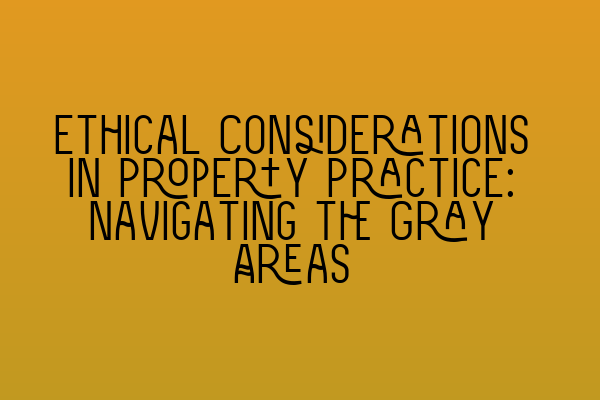Ethical Considerations in Property Practice: Navigating the Gray Areas
Welcome to SQE Property Law & Land Law, where our team of solicitors and experts are committed to providing you with the highest standard of professional and ethical property practice. In today’s blog post, we will explore the ethical considerations that often arise in property law, and offer guidance on how to navigate the gray areas.
1. Duty of Honesty and Transparency
As property practitioners, we have a duty to act honestly and transparently in our dealings with clients, colleagues, and all other parties involved in a transaction. This means providing accurate and complete information, disclosing any conflicts of interest, and avoiding any misleading or deceptive practices. Our article on Misrepresentation in Contracts: Unveiling Deceptive Practices provides a comprehensive overview of this topic.
2. Maintaining Client Confidentiality
Client confidentiality is of utmost importance in property practice. We must ensure that any information provided by our clients remains confidential, unless expressly authorized to disclose it. This principle extends beyond the duration of our client relationship and includes protecting their interests even after the transaction is complete.
3. Conflicts of Interest
Conflicts of interest can arise in property practice when our personal or professional interests conflict with our duty to act in our clients’ best interests. To navigate this, we must always prioritize our clients’ interests and either avoid taking on conflicting representations or obtain the necessary consents and waivers. Transparency and open communication are key in managing conflicts of interest.
4. Acting Professionally and Competently
As property practitioners, it is crucial that we act professionally and competently in all aspects of our work. This includes staying up-to-date with changes in property and land law, continuously developing our skills and knowledge, and providing accurate advice and representation to our clients. Understanding the SQE Contract Law Syllabus is essential in ensuring a solid foundation of legal knowledge. For an in-depth analysis, refer to our article on A Closer Look at SQE Contract Law Syllabus.
5. Avoiding Unlawful Activities
Engaging in any unlawful activities, such as money laundering or fraud, is strictly prohibited in property practice. We are obligated to conduct due diligence on all transactions, identify any suspicious activities, and report them to the appropriate authorities. Maintaining integrity and upholding the law are fundamental to ethical property practice.
6. Continuing Professional Development
Continuing professional development is vital for property practitioners to keep abreast of legal developments and enhance their skills. By actively participating in educational programs, workshops, and seminars, we can ensure that our knowledge and expertise are up to date, thereby better serving our clients. For a deeper understanding of influential judicial decisions, refer to our article on SQE Contract Law: Analyzing Landmark Cases and Influential Judicial Decisions.
7. Valuing Diversity and Inclusion
In property practice, valuing diversity and inclusion is essential to maintaining an ethical workplace and client service environment. We must respect and embrace individual differences, provide equal opportunities, and ensure that different perspectives are considered and respected. By fostering inclusivity, we can create a more equitable and just profession.
8. Putting Clients’ Interests First
Above all else, property practitioners must always prioritize the interests of our clients. This means providing accurate advice, acting in their best interests, and ensuring that their rights and needs are protected. Understanding the rights and limitations of contractual capacity is crucial to fulfilling this duty. For an in-depth exploration, refer to our article on Understanding Contractual Capacity: Rights and Limitations.
Conclusion
In the complex world of property law, navigating the gray areas of ethical considerations can be challenging. However, by adhering to a strong ethical framework, staying informed about legal developments, and constantly striving to improve our skills and knowledge, we can ensure that we provide the highest level of professional and ethical property practice. To test your knowledge on contract law, we recommend trying out our Interactive SQE Mock Tests for Contract Law.
Thank you for reading and for choosing SQE Property Law & Land Law as your trusted legal partner.
